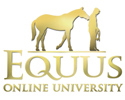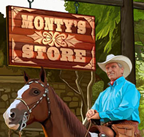Hi to all!
I need advice. My sister tried to do a join up with their 4 year old mare. After the mare showed all 4 signs, she tried to arch but the horse reared and tried to bite. The mare is very dominant and was handled very often (maybe too much) in her first 4 years. The other horses also allowed her to do whatever she pleases when she pleases to do so. I've never seen any act of dissipline towards her from either her mother of the other horses in the herd. She is also very sensitive. I think her reaction might be because of the fact that she is maybe not approached with "correct eyes" and might feel threatened as she is so sensitive. She might also rear or bite if she is lead away from the pasture to so work. I havent seen my sister do the actual join up so I'm guessing. Just strange that a horse who just communicated that she wants to negotiate would go back on her side of the bargain. A horse would never do that, would they?
← back
My Join-Up® Experience
horse rears and bite after join up

Rewards
Subscribe to Equus Online University and become a part of Monty's worldwide mission to leave the world a better place for horses and for people too.
Students automatically gain access to special rewards, such as exclusive discounts at the Monty Roberts Online Shop. Visit Monty Roberts Online Shop.



Hi Annelie
Maybe this mare being so well handled and also sensitive finds Join Up confusing - some do. They already know to come to you, be caught and handled and they don't understand why they are being pushed away all of a sudden - I have heard of this before with other horses. Perhaps you should look at that first and see if the rearing and biting continues - if it does then deal with that by working the horse from the ground each time the negative behaviour starts. Hope this helps. Cheers Jan
I second Griffo Girl. Either that or the join-up hasn't been executed correctly and the horse is taking charge.....?
Dear Annelie, the language of equus is is the language of the horse. We humans have sometimes a different veiw on this "sending awayy" than the horses. The horse does not put any emotional value in "I wonder why I was sent a way", they simply react to being moved. It is important that we humans understand that horses are either being moved or is the one moving other horses. The set up in the horses brain is outlined to get input from every direction.
If a horse gets confused it is because our body and mind send mixed messages. It is a very delicate task to fine tune your mind and body, getting the right energy flow and be perfect with your eyes when doing Join-Up® and working with horses. It is also a big difference if we have the intention that we want the horse to do Join-Up® with us or demanding the horse to do it. The 4 signs will come when you lead the horse, ride the horse and work and train with the horse - it is signs that will come if they get frightened in the pasture, it is their language and their way of communicating with whatever is happening in their life.
Rearing and biting when being lead to and from the pasture clearly tells us there is something going on in the interaction with horse and human. The horse is "saying" something.
Let´s think of it this way: in a partnership you have 50 points each, or 50% of the partnership. It is a live and fluent relationship were the "points" flow" back and forth. Just like with humans, questions are being asked and answers are given. If we do not answer the questions the horse have, it means yes to them. Or they get very confused if we say Yes one second and No the other.
The orientation before Join-Up® gives you a good indication of what horses "think of humans", and in the sending away you also feel the intention from the horse. In the turns you also feel and see how the horse react and many times they can turn in towards you to view if you are really sure of what you are doing, standing your ground and are tuned with your intention and your body language including your eyes.
On our courses and clinics, and also thinking back on the "before my education with Monty", horses will get You to Join-Up® with them, and they have 80 points and you 20! They know their language much better then us reading a book or watching a film.
I would suggest to think this way: safety is everything as number one, with the information on how the horse is with other horses gives you a clear indication on what type of horse it is. Second, practice on each other, human to human, and film yourselves so you can become good in this new language.
I too, have read books and then gone out to the pasture and had in mind: Now I will Try This! The horse has NO IDEA I read a new book, all of a sudden acting very different from the day before, and they get very confused. Some horses "speak with BIG LETTERS" and others try to ignore my "bad behavior"!
The eyes is essential, the intention is essential and knowledgs is essential. Do stay safe, practice and strive to become the best horseowner possible. Never forget it is their language, not something they should learn.
If possible, send a video clip when the horse IS LEAD by a human, I recommend NOT to attempt Join-Up® again. We humans need to be good to ourselves and our horses and figure out what the horses needs before we get into trouble. Do stay safe, keep up the Good work and hope to hear from you again! Warmest CI Ann Lindberg/Sweden
Thanx for all your input. Ann, what you say makes perfectly sense. I know that my sister never read Monty's literature, but applied what she knew of join up by hearsay. She also applies little bit Pirelli as well as material from a course she did on the alpha mare and how to handle her. She thinks that Montys methods do not apply for the alpha mare and now mixes everything up. They do not however use violence. If I were Zoe(the horse) I would be confused.Seems like Zoe loves being ridden, but any thing she doesnt want to do is accomplished by diverting her attention to something else. Thank you so much for your insight. I will try to get a video clip of their interaction (on safe terms). Greetings Annelie
Lovely Annelie, it makes a lot of sense too what you wrote about " a little of this method and a little of that method" it is very confusing for our horses, and we just thing we are "trying new things". The eyes is crutual, just as you point out.
I often say on my courses and demonstrations that It does not matter what method you are using as long as you speak Equus :) Keep in touch and I know it is not always easy to be "the good one" as the sister wanting her to be safe, yet she is lucky having you in her life! Warmest CI Ann Lindberg
Jan; Right on, I fully agree. I have seen several horses that have been "properly" handled from birth and have an excellent well established hierarchical relationship with their owners. They come to their owner on cue and are responsive, well disciplined and are not a problem at all with training/riding. My horses are living proof!!!
Then, join up was tried with them....and with negative results, sometimes disastrously so, in that, the relationship that "was there" literally ceased to exist. Or the join up worked all right, and these horses became incredibly obedient, spiritless, "dead in the eye" automatons, virtually devoid of that wonderful spark of life that is so unique to these animals. Jan is absolutely correct, there must be hundreds of horses out there that "join-up" simply should not be done with, NEVER. It is a great tool, that is becoming very much abused it appears, just for the sake of convenience.
If you watch wild herds, or for that matter "any" herd really, once these roles are established and the "matriarch" is established, you will never (research has shown), if this lead mare dies, you will never see one of the "lower" (on the totem pole" mares assume the role. Rather, you will see an "independent" do so.
My point?....If your role is already established with your horse, and its a good and satisfying and mutually acceptable one, then what the heck do you want to do "join-up" for.....just think about it, before you do is all that I am sure every horse would ask of you, if they could only speak.
Jan; Right on, I fully agree. I have seen several horses that have been "properly" handled from birth and have an excellent well established hierarchical relationship with their owners. They come to their owner on cue and are responsive, well disciplined and are not a problem at all with training/riding. My horses are living proof!!!
Then, join up was tried with them....and with negative results, sometimes disastrously so, in that, the relationship that "was there" literally ceased to exist. Or the join up worked all right, and these horses became incredibly obedient, spiritless, "dead in the eye" automatons, virtually devoid of that wonderful spark of life that is so unique to these animals. Jan is absolutely correct, there must be hundreds of horses out there that "join-up" simply should not be done with, NEVER. It is a great tool, that is becoming very much abused it appears, just for the sake of convenience.
If you watch wild herds, or for that matter "any" herd really, once these roles are established and the "matriarch" is established, you will never (research has shown), if this lead mare dies, you will never see one of the "lower" (on the totem pole" mares assume the role. Rather, you will see an "independent" do so.
My point?....If your role is already established with your horse, and its a good and satisfying and mutually acceptable one, then what the heck do you want to do "join-up" for.....just think about it, before you do is all that I am sure every horse would ask of you, if they could only speak.
Thanks Paul - I am glad you understood what I was trying to say. Cheers Jan
I so agree with Jan and Paul, too many times I have found myself saying on here "You already have Join Up, what is it you are looking for?" I share your ocncern that too many times the point of Join Up is being missed - it is seen as a task to be accomplished for the human to "do", rather than it being ONE method of establishing trust and a bond with a horse, particularly useful for new/unknown/abused horses but when he is already your 'best friend' he is "Joined up" :-)
I appreciate this forum, and everybody's input, as it gives me a better perspective of the situation from outside. I must admit though that I've always found value in join-up. My own 2 horses are with me now for 15 years. I cared for several other horses as well over these years. I've had a bond with all of them, but especially my own highly strung, highly sensitive horse. I only learned about join-up a few years ago (after I already had a bond with my own horses). I have done join-up with them not to create a bond, but to affirm that they understood my years of dedicated human efforts to tell them they can trust me. Although my join-up had been a very clumsy effort, I believe they had grace with me and I got my affirmation! I therefor don't understand why a proper join-up should have any negative influence on your relationship with your horse, as the message you send with join-up, should be the same as the message you have been sending in your own way with your own (probably human) language - just better understood. I had my horses' trust before join-up, but not at the same level as after join-up. I think its like saying to an Afrikaans speaking person - a friend - "you can trust me" for a few years, learn to speak Afrikaans and then say to him/her "jy kan my vertrou". It means the same, just better understood. That is, if join-up is the language of the horse. If not understood by the horse, it's not their language. Maybe that is why they react different - because we are not fluent. This is why this incident was such an issue to me - why would a horse that apparently already had a bond (at least some trust) in a way with her owner, communicate different messages if she really understood what her owner said? I believe there is miscommunication somewhere.
In this week’s question and answer Monty wrote about a Peruvian Paso owned by a lady in Southern California. I was fortunate to watch Monty work with this horse for the first time in the round pen doing Joint Up at Flag Is Up Farm. Monty was quick to point out that he had worked several session with his horse by schooling with the dually halter before trying join up because this horse was just too dangerous to do join up with without first schooling with the dually halter because he would try to run over you and bite if given the chance. Before this demonstration I thought the first thing to do with a new horse was join up and now I know depending on the horse this maybe wrong. If the horse is dangerious for any reason schooling with the dually in a safe environment is necessary to set ground rules for appropriate behavior and control before join up in tried. Depending on your experience wih this type of horse a professional trainer trained in Monty’s methods may be need. Good luck and be safe.
Very interesting discussion! My Arab Cross mare is a dominant mare & i was at a bit of a loss in handling her at first, then i was lucky enough to go to one of Monty's demos a couple of weeks later. I watched all the handling with a lot of concentration & i certainly by instinct DIDN'T do join up until i felt more confident about it & had done a fair bit of groundwork with her as she would bite & kick out; she didn't trust me, didn't know me & is a very sensitive mare. I had to earn some trust from her before feeling safe enough for join up & she was hard work!!!!
I gained her trust by being very quick to praise her when she tried to do the right thing & tried to ignore most of the negative stuff & she quickly decided she liked being told what a good girl she was.
I was also "taught" how to join up by her companion, a rescue Fell pony who is the best teacher ever!!! So at least i had some idea of what to do before trying the difficult one.
Safety first is very important & to be in a pen with a loose horse that is going for you is not safe. Dually work first, i agree very much.